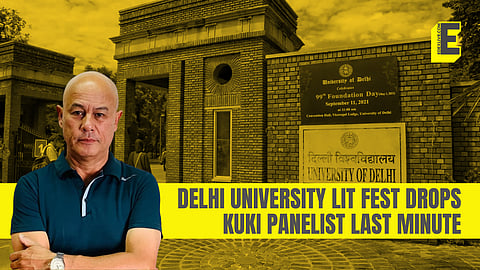

The Delhi University Literature Festival (DULF) has recently come under fire for its last-minute removal of Dr Seilen Haokip, a Kuki scholar, from a panel discussion.
Dr Haokip was initially invited to speak on a panel titled The Great Game East: The Northeast Cauldron at Shri Ram College of Commerce (SRCC), scheduled for Sunday, February 23, the final day of the literature festival. The panel was set to feature former Lieutenant General Rajat Sethi, and Rajeev Bhattacharyya as co-panellists.
The discussion was based on a Swedish journalist's book exploring insurgency in the Northeast.
However, according to the Kuki Students' Organisation (KSO), his invitation was rescinded at the last minute due to pressure from COCOMI (Coordination Committee of Civil Bodies of the Meiteis), a powerful civil society group in Manipur.
The KSO, Delhi & NCR, has strongly condemned the move, calling it an act of "academic censorship" and discrimination against minority voices.
"Dr Haokip was informed of his exclusion only after he arrived at the venue. He was picked up from his home, allowed to reach the event, and only then told that he was no longer part of the panel. This is not just unfair — it is humiliating," said the president of KSO, Paojakhup Guite, in a conversation with EdexLive.
The controversy stems from allegations that Dr Haokip was associated with an insurgent group. However, KSO has refuted this claim.
"The claim made against him was that he was part of an insurgent group. Yes, he was once associated with an insurgent group, but that group is currently in talks with the Government of India. Meanwhile, Meitei insurgent groups that are listed by the MHA continue to operate freely. This is a clear double standard," the KSO president added.
“Intellectual spaces reduced to political entities”
The KSO has accused Delhi University of bowing to political pressure and suppressing Kuki voices.
In its press release, the organisation stated, "Delhi University, as an institution of global repute, is expected to be a sanctuary of free speech, open discourse, and intellectual inquiry. Instead, it has bowed to external pressures and compromised its credibility by preventing a key stakeholder from speaking on an issue that directly affects his people."
The organisation argues that Dr Haokip’s exclusion is part of a broader pattern of systemic exclusion faced by the Kuki community, both in academia and in national discourse.
"What happened to Dr. Haokip is not just about one individual—it is about the shrinking space for academic freedom. This is deeply disheartening for Kuki students who came to this university believing in democratic values and open discourse," the organisation added.
The KSO has called on Delhi University to ensure that all voices — especially those from marginalised communities — are given a fair platform.
"A literature festival that censors and excludes voices under political pressure is no longer a platform for knowledge-sharing but a tool for reinforcing majoritarian narratives," the press release concluded.
As of now, Delhi University has not issued an official response regarding the allegations.
